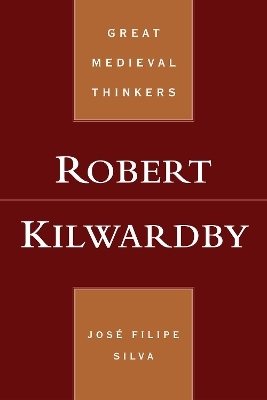
Robert Kilwardby
Oxford University Press Inc (Verlag)
978-0-19-067476-2 (ISBN)
Archbishop of Canterbury from 1272 until his death in 1279, the Dominican friar Robert Kildwardby has long been known primarily for his participation in the Oxford Prohibitions of 1277, but his contributions spread far wider. A central figure in the Late Middle Ages, Kilwardby was one of the earliest commentators of the work of Aristotle, as well as an unwavering proponent of Augustinian thought and a believer of the plurality of forms. Although he was a prominent thinker of the time, key areas of his philosophical thought remain unexamined in contemporary scholarship.
José Filipe Silva here offers the first book-length analysis of Kilwardby's full body of work, which is essential in understanding both the reception of Aristotle in the Latin West and the developments of later medieval philosophy. Beginning with his early philosophical commitments, Silva tracks Kilwardby's life and academic thought, including his theories on knowledge, moral happiness, and the nature of the soul, along with his attempts to reconcile Augustinian and Aristotelian thought. Ultimately, Robert Kilwardby offers a comprehensive overview of an unsung scholar, solidifying his philosophical legacy as one of the most influential authors of the Late Middle Ages.
José Filipe Silva is Professor of Medieval Philosophy at the University of Helsinki. He is the Director of the ERC research project Rationality in Perception: Transformations of Mind and Cognition 1250-1550, and the author of Robert Kilwardby on the Human Soul: Plurality of Forms and Censorship in the Thirteenth Century.
Series Foreword by Brian Davies
Preface
List of Abbreviations
Introduction
I. LIVING
The Life and Works of Robert Kilwardby
The Life
The Works
II. BEING
Introduction
The Metaphysics of Plurality
Matter
Form
The Letter to Peter of Conflans
Introduction
Animal Generation
Active Potencies
The Human Soul
Is the Soul (the) One?
The Unity of Form(s)
At Oxford in 1277
Excursus: The Human Soul in the Sentences
Motion
A Questionnaire
Celestial Motion
Time
III. BEING LOGICAL
Introduction
Words, Thoughts and Things
Interpretation
The Category of Relation
IV. KNOWING
Introduction
Perception
On the Reception of Sensible Species
Attention and Activity
Cognition
Introduction
Thinking
Representing and Instantiating
Universality
Scientific Knowledge
Introduction
Knowledge
Demonstration
Pre-existing Knowledge
First Principles
Principles
Conditions for Predication
Signs of Affections
What Can Be Demonstrated?
Definitions
Disciplining the Disciplines
Subalternation
V. BEHAVING
Introduction
Ethics: The Science of Happiness
The Good
The Cause of Happiness
The Virtues
Voluntary Action
VI. BELIEVING
Introduction
Theology
Divine Trinity
Where from? Creation as a Kind of Change
Angels
Creator and Creatures
Which One? The Free Choice of the Will
By Heaven's Grace
Gratis: Sin and Evil
On Sacraments
Faith
VII. INCARNATING
Introduction
I Assume
I Know
I Suffer
Bibliography
Notes
Index
| Erscheinungsdatum | 12.06.2020 |
|---|---|
| Reihe/Serie | Great Medieval Thinkers |
| Verlagsort | New York |
| Sprache | englisch |
| Maße | 206 x 137 mm |
| Gewicht | 363 g |
| Themenwelt | Religion / Theologie ► Christentum ► Kirchengeschichte |
| ISBN-10 | 0-19-067476-8 / 0190674768 |
| ISBN-13 | 978-0-19-067476-2 / 9780190674762 |
| Zustand | Neuware |
| Informationen gemäß Produktsicherheitsverordnung (GPSR) | |
| Haben Sie eine Frage zum Produkt? |
aus dem Bereich


